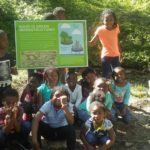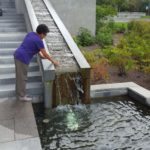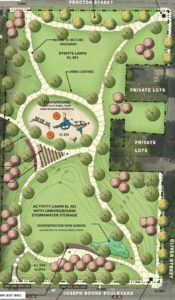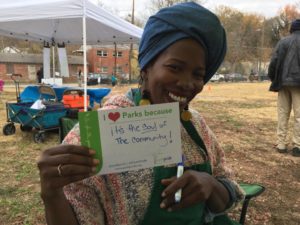
Proctor Street (left) and the site for Boone Park West (right) are prone to flooding during rain events. Photos: Chattahoochee Riverkeeper
Proctor Creek Watershed, Atlanta
Proctor Creek begins in the western part of downtown Atlanta and flows westward through highly urbanized metropolitan areas before emptying into the Chattahoochee River, Atlanta’s main source for drinking water. As the largest city in Georgia, and the ninth-largest metropolitan area in the United States, Atlanta is covered with more than 20 percent impermeable surfaces. Downtown Atlanta, and the 19-square miles around it, is served by a combined sewer system with pipes that carry both sewage and stormwater to the same treatment facilities.
Combined sewer overflows (CSOs) are a known problem in Atlanta. Since 1995 when the Chattahoochee Riverkeeper sued the City of Atlanta for violations of the Clean Water Act, there have been improvements to the wastewater infrastructure. However, updating buried pipes is more difficult in heavily urbanized areas like Proctor Creek. Today, the Proctor Creek Watershed is still prone to CSOs, flooding neglected neighborhoods with bacteria laden waters. The headwaters of Proctor Creek rarely meet Georgia’s state standards for fecal coliform. In addition to poor water quality, the neighborhoods located in the headwaters of Proctor Creek – English Avenue and Vine City – face other challenges that result in 40 to 50% vacancy rates and household poverty rates of 60%.
In 2013, the Proctor Creek Watershed was designated by the EPA as an Urban Waters Federal Partnership location, with goals to engage the community while improving water quality, providing green spaces, and supporting green infrastructure. The Conservation Fund was awarded an EPA Urban Waters Small Grant in 2016 to work with residents and multiple organizations of the Proctor Creek Watershed to create green infrastructure solutions that benefit the community and the environment.
Parks with Purpose
Through their Parks with Purpose program, The Conservation Fund works with many organizations and funding partners to create green infrastructure solutions around the country. They have a strong history of providing green spaces that are not only beneficial to the environment but also valuable to the community. In Atlanta, The Conservation Fund has been working for over a decade to complete more than 25 projects and protect more than 200 acres of green space in urban areas. The community is involved every step of the way through education and outreach as well as job training and workforce development.
Parks with Purpose projects in Atlanta are bringing to life a vision that started in 2009 when Georgia State Representative, “Able” Mable Thomas, approached Park Pride with an idea to create parks that prevent stormwater flooding in her community. From this idea, and with cooperation from many organizations, the Proctor North Avenue Green Infrastructure Vision Plan (PNA) was completed in 2010. Since then, several of the locations identified by the study have been transformed. In partnership with Park Pride and a variety of community partners, The Conservation Fund completed two parks in the Proctor Creek Watershed, including expansion of green infrastructure in the Vine City Park and creating Lindsay Street Park, which was awarded EPA’s 2016 Rain Catcher Award.
Supported by their EPA Urban Waters Small Grant, The Conservation Fund has also initiated two new projects in the Proctor Creek Watershed: Boone Park West and Mattie Freeland Park. In partnership with Park Pride, Community Improvement Association, and Environmental Community Action (ECO-Action), the Fund has engaged community members through meaningful public outreach and education. From the beginning, community residents became contributing members to the design and implementation of park plans.
In July 2016, The Conservation Fund established a steering committee of 20 community members who attended monthly planning and design charrettes. These charrettes allowed the community to share their hopes and concerns while The Conservation Fund shared information about flooding issues and green infrastructure solutions. Initial focus was on the Boone Park West project, a low-lying city-owned vacant lot located within the English Avenue neighborhood; the land was often flooded, unused and fenced off from the community.
- Community members participate in activities and events to provide feedback on Boone Park West design plans. Photos: Park Pride
- Community members participate in educational activities and green infrastructure tours. Photos: The Conservation Fund
To get feedback from the broader community, The Conservation Fund and partner organizations attended several community events and hosted an event at the Boone Park West site in December 2016. By May 2017, the Boone Park West Vision Plan was created by Park Pride in cooperation with the steering committee and approved by the English Avenue Neighborhood Association and the City of Atlanta Neighborhood Planning Unit-L. EPA dollars ensured that the steering committee was able to speak directly with the design contractors – not only providing their feedback but also learning about geotechnical planning and the process of real-world engineering.
Boone Park West is estimated to have about 450,000 gallons of storage capacity and a total annual capture of 7 million gallons of water.
Official groundwork began on the park in March 2018!
To further engage the community, Community Improvement Association and Chattahoochee Riverkeeper hosted green infrastructure tours in July through November of 2017. Residents of the Proctor Creek Watershed observed firsthand different green infrastructure options, like detention ponds, bioswales, and rain gardens. This helped to steer their decisions for parks in their own neighborhoods. Additionally, college students, elected officials and health professionals attended the tours to learn about the benefits of green infrastructure for the whole community.
EPA funding also supported community education efforts. ECO-Action – in partnership with the West Atlanta Watershed Alliance and American Rivers – created the Atlanta Watershed Learning Network (AWLN). In April 2017, the AWLN hosted their first class for 20 residents from the Proctor Creek Watershed. Training topics included watershed science and green infrastructure, as well as advocacy and community empowerment. From this work with the community, AWLN published a newsletter that provides information about Atlanta watersheds and includes community voices. A second cohort of the AWLN began in April 2018 and is currently underway.
In all, the outreach and education phases of the Boone Park West Project engaged 200-300 community members. Members of the community and The Conservation Fund are actively engaged in a similar effort around Mattie Freeland Park, which is located less than a mile from Boone Park West and was created with strong leadership from community members. The Conservation Fund and partners are supporting the community leadership by adding green infrastructure components to the original Mattie Freeland Greenspace Vision Plan.
EPA Urban Waters as a Catalyst for Change
The Conservation Fund’s EPA Urban Waters Small Grant initiated work at Boone Park West and Mattie Freeland Park, with most of the funding focused on engaging Proctor Creek Watershed residents through education and involvement in park design. The progress catalyzed by the Urban Waters small grant continues today through various community-driven efforts:
- AWLN is creating web-based curriculum modules that will be available to the public at large and applicable to diverse urban water settings.
- Community members are engaged in job training and workforce development during the construction of the parks. The Conservation Fund has allocated funds to support a field supervisor to work with community youth and the contractors so that substantial on-site training is provided.
- A Park Ambassador program has been initiated to support the community volunteers that take care of the parks and to encourage cooperation between park leaders.
- A Peer Exchange will be hosted by The Conservation Fund in June 2018 to share information with leaders from other municipalities about green infrastructure projects and methods for authentic engagement of community members.
“The Conservation Fund is creating new parks and greenspaces that capture stormwater, increase community capacity, and improve overall quality of life in some of Atlanta’s most challenged neighborhoods.”
~Shannon Lee, The Conservation Fund
Through their Parks with Purpose program, The Conservation Fund puts people at the forefront of watershed science. Joining with residents and community organizations within the Proctor Creek Watershed, The Conservation Fund is creating greenspaces that improve the environmental health of communities by easing floods from stormwater runoff and increasing groundwater storage capacity. Residents are also educated about their watershed and empowered to make decisions that are beneficial to their neighborhoods. In this way, The Conservation Fund and partners are building capacity in communities to make way for lasting change.
Resources and Further Reading
UWLN Resources
- Neighborhood Water Watch: Bacterial Monitoring that Engages Citizens and Improves Water Quality
- Visioning for Green Infrastructure
- Local Knowledge: The Key to Restoring Proctor Creek
From The Conservation Fund
EPA Video Series: Making a Visible Difference in the Proctor Creek Watershed:











